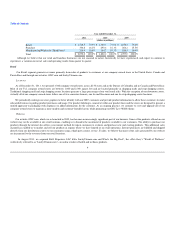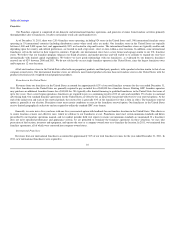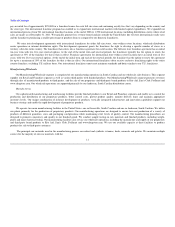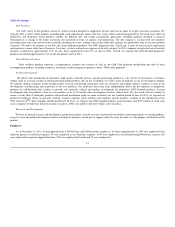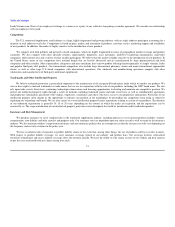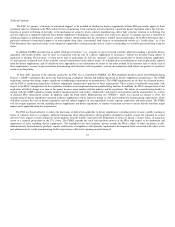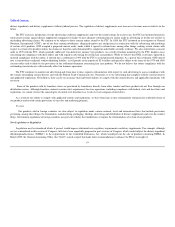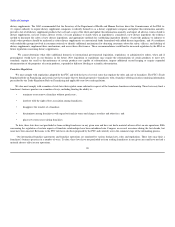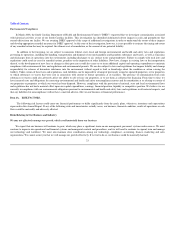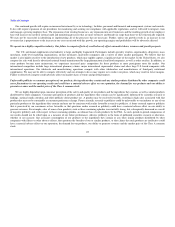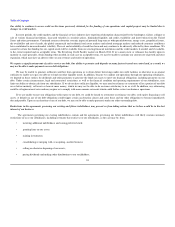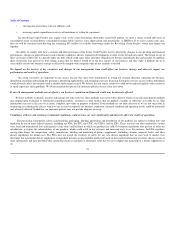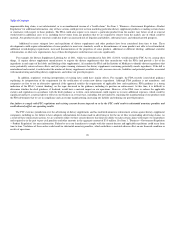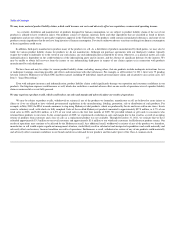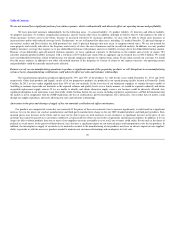GNC 2012 Annual Report Download - page 21
Download and view the complete annual report
Please find page 21 of the 2012 GNC annual report below. You can navigate through the pages in the report by either clicking on the pages listed below, or by using the keyword search tool below to find specific information within the annual report.
Table of Contents
dietary ingredients and dietary supplements without judicial process. The regulation of dietary supplements may increase or become more restrictive in the
future.
The FTC exercises jurisdiction over the advertising of dietary supplements and over-the-counter drugs. In recent years, the FTC has instituted numerous
enforcement actions against dietary supplement companies for failure to have adequate substantiation for claims made in advertising or for the use of false or
misleading advertising claims. We continue to be subject to three consent orders issued by the FTC. In 1984, the FTC instituted an investigation of General
Nutrition, Incorporated ("GNI"), one of our then existing subsidiaries, alleging deceptive acts and practices in connection with the advertising and marketing
of certain of its products. GNI accepted a proposed consent order, under which it agreed to refrain from, among other things, making certain claims with
respect to certain of its products unless the claims are based on and substantiated by competent and reliable scientific evidence. We also entered into a consent
order in 1970 with the FTC, which generally addressed "iron deficiency anemia" type products. As a result of routine monitoring by the FTC, disputes arose
concerning our compliance with these orders and with regard to advertising for certain hair care products. While we believe that GNI, at all times, operated in
material compliance with the orders, it entered into a settlement in 1994 with the FTC to avoid protracted litigation. As a part of this settlement, GNI entered
into a consent decree and paid, without admitting liability, a civil penalty in the amount of $2.4 million and agreed to adhere to the terms of the 1970 and 1989
consent orders and to abide by the provisions of the settlement document concerning hair care products. We do not believe that future compliance with the
outstanding consent decrees will materially affect our business operations.
The FTC continues to monitor our advertising and, from time to time, requests substantiation with respect to such advertising to assess compliance with
the various outstanding consent decrees and with the Federal Trade Commission Act. Our policy is to use advertising that complies with the consent decrees
and applicable regulations. Nevertheless, there can be no assurance that inadvertent failures to comply with the consent decrees and applicable regulations will
not occur.
Some of the products sold by franchise stores are purchased by franchisees directly from other vendors and these products do not flow through our
distribution centers. Although franchise contracts contain strict requirements for store operations, including compliance with federal, state and local laws and
regulations, we cannot exercise the same degree of control over franchisees as we do over our company-owned stores.
As a result of our efforts to comply with applicable statutes and regulations, we have from time to time reformulated, eliminated or relabeled certain of
our products and revised certain provisions of our sales and marketing program.
Foreign
Our products sold in foreign countries are also subject to regulation under various national, local and international laws that include provisions
governing, among other things, the formulation, manufacturing, packaging, labeling, advertising and distribution of dietary supplements and over-the-counter
drugs. Government regulations in foreign countries may prevent or delay the introduction, or require the reformulation, of certain of our products.
New Legislation or Regulation
Legislation may be introduced which, if passed, would impose substantial new regulatory requirements on dietary supplements. For example, although
not yet reintroduced in this session of Congress, bills have been repeatedly proposed in past sessions of Congress which would subject the dietary ingredient
dehydroepiandrosterone ("DHEA") to the requirements of the Controlled Substances Act, which would prevent the sale of products containing DHEA. In
March 2009, the General Accounting Office (the "GAO") issued a report that made four recommendations to enhance the FDA's oversight of
19


